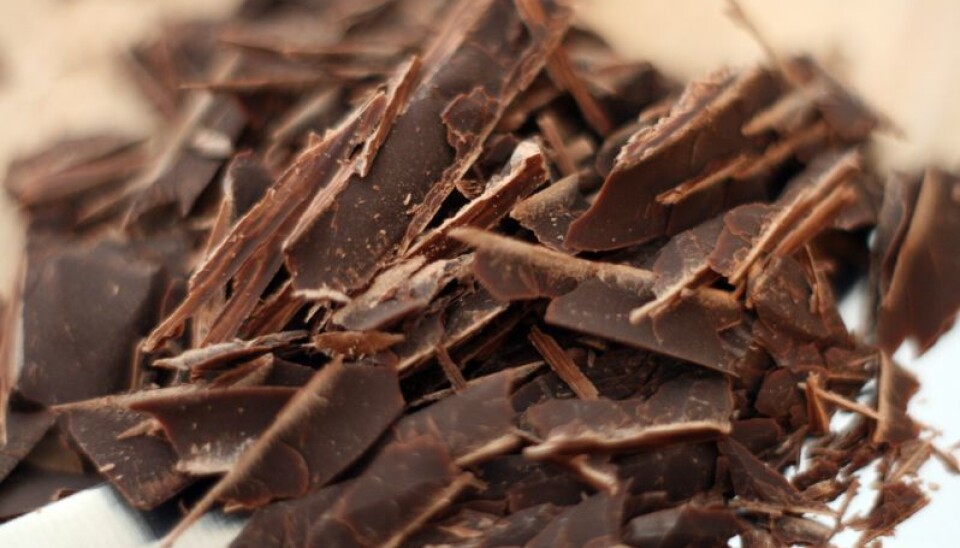
Health by dark chocolate?
You’ve heard the claims — chocolate reduces stress, makes you smarter, prevents cardiovascular disease—and one expert even counts it as a vegetable. What’s the real skinny behind those assertions?
Who wouldn’t want to believe all that good news that keeps popping up and assuring you that “you can eat chocolate with a clear conscience”?
One thing has been ascertained: dark chocolate is a better choice than milk chocolate if you want to watch your weight but still indulge your sweet tooth.
What goes into this “brown gold”? On the one hand studies have identified substances in cocoa that have beneficial health effects, but on the other hand, the sugar and fat consumed in the chocolate form counteract some of those benefits.
Eat your veggies
Of course, the good news comes with the usual provisos. The chocolate has to have at least 70 percent cocoa and you can’t just eat a whole bar, since even dark chocolate contains the downsides of fat and sugar.

When we read that dark chocolate may have a beneficial effect on health, we’re really talking about cocoa that comes from roasted cacao seeds. And the more cocoa in the chocolate, the better.
Harald Carlsen, a professor at the Norwegian University of Life Sciences (NMBU) explains that so-called flavanols take the blame — or credit — for health claims.
Flavanols are chemical substances that are a class of flavonoids. These are in turn a form of polyphenols, often called antioxidants. In short, antioxidants protect the cells, proteins and DNA in our bodies.
These substances also appear to be effective against inflammation in the body, which can prevent cardiovascular diseases.
Fruits and vegetables are another well-known source of antioxidants, and this has given rise to the idea that dark chocolate should be considered one of the “5 A Day” fruit and vegetable portions.
This may sound a little over the top, but Carlsen basically agrees.
“When it comes to fruits and vegetables, a lot of evidence suggests that consuming polyphenols, as well as vitamins and fibre, is what provides these good health effects,” he says.
Optimal consumption proves elusive
Opinion is divided on how much chocolate is recommended. Some nutritionists suggest limiting intake to nine grams a day, or one to two squares of chocolate. Others recommend up to 20 to 30 grams a day. Other research indicates that eating more than 6.7 grams of chocolate diminishes the beneficial effects.
Whether the same positive health effects achieved in a research study can be matched in normal everyday conditions is another question. Researchers sometimes give their subjects much larger amounts of the healthful substance in tests than are possible to consume in one’s real life and diet.
And as if that weren’t confusing enough, flavanol quantities seem to vary widely among different chocolate manufacturers, writes Science News.
Professor Eric Ding of Harvard University reviewed the cocoa studies and found that the average dose of flavonoids was 400 milligrams a day. “The problem is,” he says in an article on Harvard’s website, “that’s about the equivalent of eight bars of dark chocolate or 30 bars of milk chocolate.”
NMBU’s Carlsen bases his estimates on figures from the US Department of Agriculture, which shows that 100 grams of dark chocolate contains roughly 100 milligrams of flavanols. He says that if you want an immediate flavanol effect, “you might have to eat almost 100 to 200 grams. But that's unrealistic. You can’t get around the fact that if you eat a whole bar of dark chocolate, you’ve consumed about one third of the recommended daily energy intake.”
But Carlsen is also sceptical about eating just one small piece of chocolate.
“I think that seems very little. If you eat about half a bar, or 50 grams, you’ll get about one-eighth of the energy intake you need. Then you're down to a level that’s not so dangerous,” he says.
Do antioxidants really help?
Many people have heard about antioxidants. Their job is to protect the body against oxidative stress, which can damage our cells and DNA. Carlsen explains that yes, polyphenols act as antioxidants in the plant they come from. But they work differently in the human body.
“Some studies show that if you drink a glass of apple juice, which contains lots of polyphenols, 90 per cent of them make it as far as the large intestine. That is, they haven’t been taken up by the body on the way there,” he says.
Presumably cocoa substances work differently than antioxidants do.
According to Carlsen, it would appear that when these substances arrive in the large intestine, they’re recognized by bacteria that break them down into substances that the body can absorb. But it’s still unclear what the mechanism is for this, the professor says.
A study published in 2014 showed that the bacteria in our gut break cocoa substances down into new compounds that reduce inflammation in the body that can put the heart at risk.
But we still don’t know everything about the actual effect of antioxidants in the diet on health, or exactly which substances the body is able to absorb from a chocolate bar.
No approved health claims
The independent Cochrane Collaboration went through various cocoa studies to see if they could find evidence for cocoa lowering blood pressure. They concluded that cocoa could actually slightly reduce blood pressure in the short term.
But despite the continual positive chocolate studies that pop up, there's still only one EU-approved health claim for cocoa flavanols. This approval allows manufacturers to claim that capsules containing 200 milligrams of cocoa flavanols can make blood vessels more elastic and thus provide better blood flow. But for now this claim is under a five-year patent, so no one else can use it.
In other words, the vast majority of producers of cocoa products cannot guarantee any kind of health effects from flavanols in their products.
Other effects, such as weight loss, mood enhancement or cell protection, have all been rejected due to a lack of scientific evidence, according to the EU website.
Distilling research credibility
With many of the studies funded by various chocolate manufacturers, does this pose a big problem for chocolate research credibility?
Carlsen thinks we have to trust that many honest scientists are trying to find the truth. But poorly designed studies and biased researchers are also out there. Meanwhile, researchers depend on working with the industry, which possesses an expertise that they don’t have.
Nevertheless, it may be okay to be a little wary of chocolate studies. Journalist John Bohannon fooled media worldwide with a prank study that showed chocolate contributed to greater weight loss.
But the research can also be good. Carlsen cites a study that was published in 2014. According to Science Daily, the study showed that participants who received a cocoa drink rich in flavanols performed significantly better on a memory test conducted both before and after the experiment.
Because the researchers for this study had a control group and administered flavanols in precise doses, they could measure the effect the drug actually had on the subjects.
But there’s a big difference between the Mars chocolate company product consumed by the study participants, and the Mars bar you buy in the store.
The study drink “contained a little sugar and very little fat. It can’t be compared with regular dark chocolate,” Carlsen points out.
So, the upshot is that if you want to be on the safe side and avoid fats and sugars, you can stick to pure cocoa powder. But it may not taste as good.
-------------------------------------
Read the Norwegian version of this article at forskning.no


































